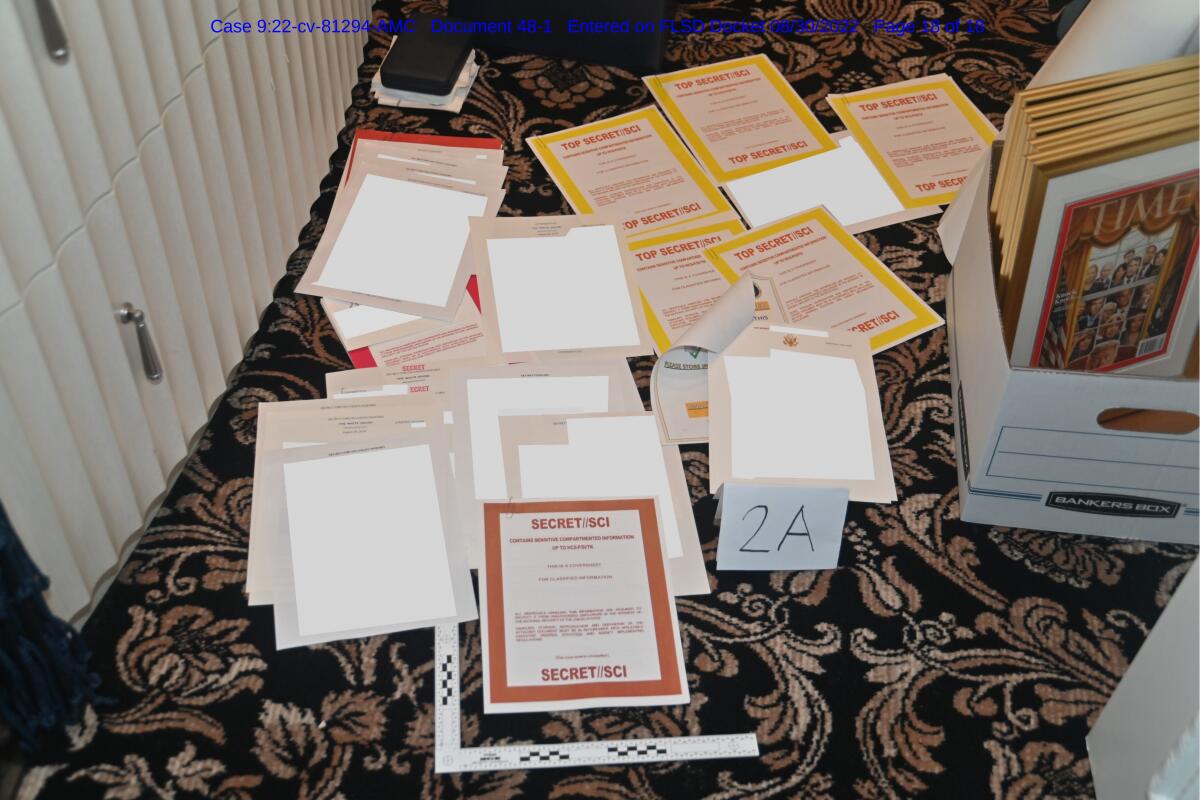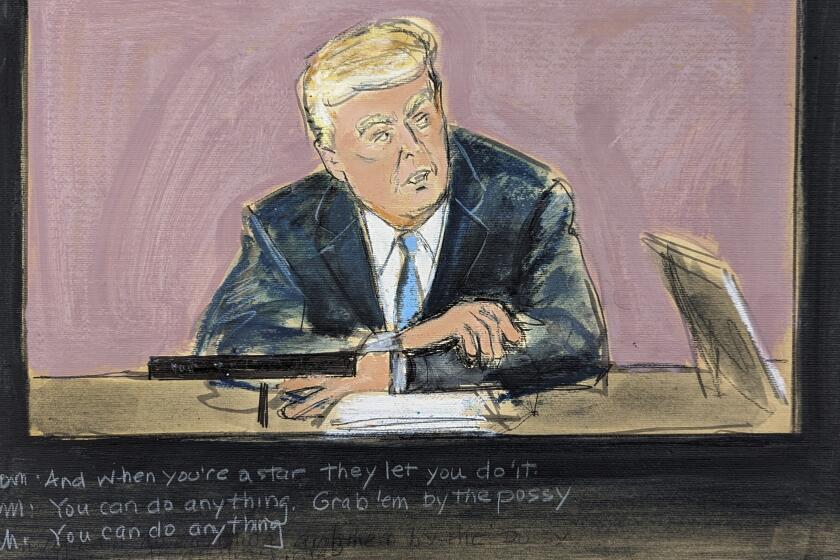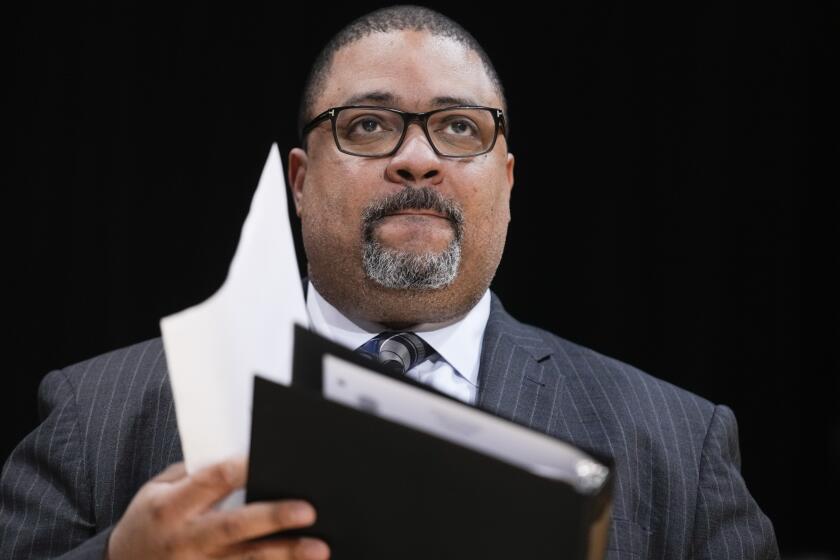The DOJ’s classified documents probe may wrap up soon. Here’s why Trump should worry

- Share via
Over the two months since Trump attorney Evan Corcoran was compelled to testify before the grand jury investigating whether the former president illegally retained classified documents, observers have been predicting that charges in the case were imminent. But those predictions have repeatedly failed to come true as special counsel Jack Smith has pursued a series of new investigative angles.
Does that suggest that Smith still doesn’t have the goods? In a word, no.
The documents case is at its core straightforward. The former president allegedly took government documents from the White House, which is one sort of crime; and, more flagrantly, failed to comply with a subpoena for those documents, lied about them and otherwise impeded federal authorities, which is another. Smith has long since assembled a formidable case that Trump did so despite knowing his conduct was against the law.
Judging by Smith’s recent flurry of activity, however, it seems the special counsel wanted to use the investigative powers of the grand jury for all they’re worth before asking it to return an indictment.
A federal jury in New York quickly returned a verdict that found the former president liable for sexual abuse and defamation of the plaintiff.
A grand jury’s defining function is to indict. But for prosecutors, the grand jury also has an indispensable investigative function, issuing subpoenas and hearing testimony from any relevant and available witness the prosecution chooses to call. For Smith, it’s an opportunity to probe Trump’s anticipated defenses, lock in witnesses’ stories and pursue investigative avenues that might or might not pan out.
All these investigative functions dry up once a grand jury returns an indictment.
Through this prism, the purpose of Smith’s maneuvers becomes clear. He has gone beyond building his basic case to gather all the information he can before asking the grand jury to return an indictment and losing its investigative powers.
Hence this week’s New York Times report that Smith had served a subpoena for information about the Trump Organization’s business dealings in seven foreign countries. The subpoena appeared designed to get at the possibility that Trump used the classified documents to strike deals with foreign governments, which would be still another serious crime, but it reportedly produced no new information.
Some commentators suggested the idea was to furnish a motive for Trump’s obstructions. But the charges Smith is likely to bring don’t require any proof of motive, and they are grave regardless of what Trump did with the documents. My sense is that Smith was exploring an investigative angle that didn’t prove fruitful.
The same goes for reports that Smith sent agents to interview much of the housekeeping and maintenance staff at Trump’s Mar-a-Lago estate. I doubt he was desperate to bolster his case with a nugget of information from an unlikely source; rather, I think he wants to leave no stone unturned while he’s still able to turn stones.
New York prosecutor Alvin Bragg’s investigation is just the beginning of Trump’s legal exposure. Charges in Georgia and from Special Counsel Jack Smith also loom.
And some of Smith’s latest maneuvers have borne fruit. Records that the National Archives recently handed over to him apparently show that Trump’s advisors told him he could not simply declassify documents with a wave of his hand as he continues to ridiculously claim. Such evidence would make it next to impossible for him to argue that he thought otherwise at trial.
Smith has also reportedly obtained 50 pages of Corcoran’s contemporaneous handwritten notes documenting not just the advice lawyers gave Trump but also the former president’s reactions, down to his hand gestures. The notes are likely to be more compelling evidence that Trump was clearly informed of his legal obligation to produce all the classified documents the government sought.
So when might we expect Smith’s t–crossing and i-dotting to end and the long-anticipated indictment to be returned? Imminently, according to the Wall Street Journal, which reported Tuesday that Smith “has all but finished obtaining testimony and other evidence” in the case. Lending credence to that report, Trump’s lawyers fired off a letter Tuesday night seeking a meeting with U.S. Atty. Gen. Merrick Garland, typically the final arrow in the quiver of a defendant trying to stave off indictment.
Smith has likely been able to make the basic case for prosecution to Garland for some time on the grounds, set out in department standards, that 1) Trump did the crimes and 2) a conviction is probable. His prolonged endgame does not suggest any fundamental weakness in the case. Rather, he’s acting with the prudence and imagination that the most important prosecution in the history of the Department of Justice requires.
Harry Litman is the host of the “Talking Feds” podcast. @harrylitman
More to Read
A cure for the common opinion
Get thought-provoking perspectives with our weekly newsletter.
You may occasionally receive promotional content from the Los Angeles Times.












